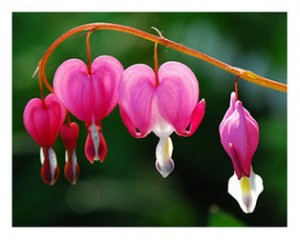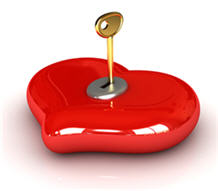The healthy heart
Those three little words aren’t always enough. We need more than “I love you,” we need less than “I love you,” we need talking and listening and actions of give and take.
The more holes punched into your heart, the more it bleeds and the less you are able to share with another.
 Those are the words of a reader commenting on his capacity to communicate with a woman, factors in his ability to do so; part of his response to “what makes a man tick.”
Those are the words of a reader commenting on his capacity to communicate with a woman, factors in his ability to do so; part of his response to “what makes a man tick.”
Perhaps this is another difference in how men and women open up to each other. When a woman’s heart bleeds, she weeps, she walks, she confides – to someone. Perhaps to her journal, to her best friend, to her mother. When a man’s heart bleeds, he walls up the wound and turns to external fixes – to a drink, an encounter, a flash of anger, the ear of a stranger. Or to no one at all.
Yes, these are generalizations.
Heartbreak
We bleed from more than the latest love match gone awry; we bleed when we are cut by disappointment in ourselves and in others. We bleed when we are carried along calmly, until a collision catches us by surprise. Then, pieces of our usual protection shatter. We are vulnerable to sharp edges and impacts.
We are vulnerable, we are reeling.
Sometimes, we hemorrhage internally, unaware of the extent of the damage from an accumulation of bumps and bruises. We are resilient in bringing our hurts to the healer. Less so, when we are silent in admitting to our injuries. We partner with our fears – fear of losing the self we recognize, fear of losing the other, fear of not being loved, fear of distance we cannot quite measure, fear of growing older, fear of being alone.
Allow the flower to blossom
It is an unusual blossom. When my eyes wander the contours of the bleeding heart I am drawn to its contradictions, to its fortitude and its delicacy, and I am moved.
It is a plant that was abundant in my mother’s garden, my mother whose talents were a marvel, my mother whose green thumb was prodigious, my mother who had no such gift for nurturing children, and the bleeding hearts took their place among the foxgloves and the blue thistles, the fiery poppies and the peppermint-striped peonies, the seasonal tulips, the regal delphinium.
I recall the wilderness corner in the back of the yard where the bleeding hearts thrived, the way they flourished in their lush, dense, silky patch of woods and darkened leaf; their bleeding that makes its home in the thicket, at ease in the shadow. Bleeding is inevitable if we are ever to approach, to dare the thorn in order to pluck the rose.
Hurt
 Men and women see things differently, some couples more than others, some friends more than others, some siblings more than others, some parents and children more than others. If we do not speak of it, if we do not try to bridge the gulf that will open and close throughout our times of sharing space and hearts, how will we ever know what is true for the other?
Men and women see things differently, some couples more than others, some friends more than others, some siblings more than others, some parents and children more than others. If we do not speak of it, if we do not try to bridge the gulf that will open and close throughout our times of sharing space and hearts, how will we ever know what is true for the other?
That we hurt each other in our silence is certain. That we hurt each other in speaking up is possible. Without the reaching out, the speaking up, the genuine listening, we’re bound to our bleeding hearts with wounds that go untended, wounds that will not heal, wounds that will grow infected. We are left to blossoming only in the shadows, in a restricted garden.
Yes, these are my observations.
Loving
I raise sons and perceive the difference in how they initiate and how they respond. One speaks more freely, and is more like his mother in that. The other is reticent when it comes to expressing feelings; he is more like his father in that. For my sons, the legacy of marriage and divorce includes deficits in the sounds and images of their parents: too little affection, too few words of love offered beyond rote, too much distance even in scenes of proximity. The bleeding hearts that thrive in a wild corner.
I bear witness to my own stem of tears in the darkness, to reworking my small beds of seed, to encouraging a more diverse and fragrant garden – less predictable, equally colorful, blooms of all varieties – springing up, in the light.
A beautiful piece of writing here. Bleeding hearts – is there any way to reverse it and heal? Lately, I don’t see any.
I can’t think of hearts without thinking of this. There’s a Jewish prayer that includes this sentence: “And these words which I command you this day you shall keep upon your heart.” The old rabbis asked, why the language upon your heart? Why not in your heart? The answer they gave is that no one, not even God, can force words into the heart. The best that can be done is to keep words on the heart, so that, when the heart is broken, the words can enter.
This is lovely, Wolf. Thank you.
Sometimes that legacy of divorce also instills a fear, a lack of confidence in, the ability of a relationship to survive. Another sad by-product.
@Carol – Yes, divorce does instill fear. I think you’re right.
@Steve – I don’t know how we heal, but I think we need to take the time to do so, and look at our choices, our tendency to repeat mistakes. You know what they say the definition of “crazy” is – doing the same thing over and over, and expecting a different outcome.
I agree. We all get hurt, yet only some of us are able to look at the wound, handle it gently, do the work of treating it, and then give it the time to heal.
I, personally, struggle with this because I grew up thinking that showing pain, admitting the wound, was a weakness. The strong don’t lick their wounds, they avenge them. This is a philosophy I vow not to pass on to my children. There is no healing — no wisdom — in it.
I love the image of these flowers. The loveliness that can come from a bleeding heart. I’ve totally turned my bleeding heart story of childhood around so that now it is a flower that blooms and perfumes my garden.
What a lovely way to view it, Rebecca.
Thank you for these breathtaking, poignant words. It’s ironic that we have bleeding hearts in our backyard too, only it’s in the middle of winter now so nothing is thriving there. But hopefully come spring, this waning garden that is our life right now will come back to life. And yes, I’m all for the more diverse garden.
“That we hurt each other in our silence is certain. That we hurt each other in speaking up is possible” — yes. And still, our silence is sometimes reinforced by the fear of hurting by speaking. This is what I struggle with most, I think. Knowing when and how to speak in order to be heard, in so many contexts.
I’d like to think that the heart, although prone to wounding, is also a resilient little flower—perhaps a perennial.
A perennial. That sounds good, Bruce.